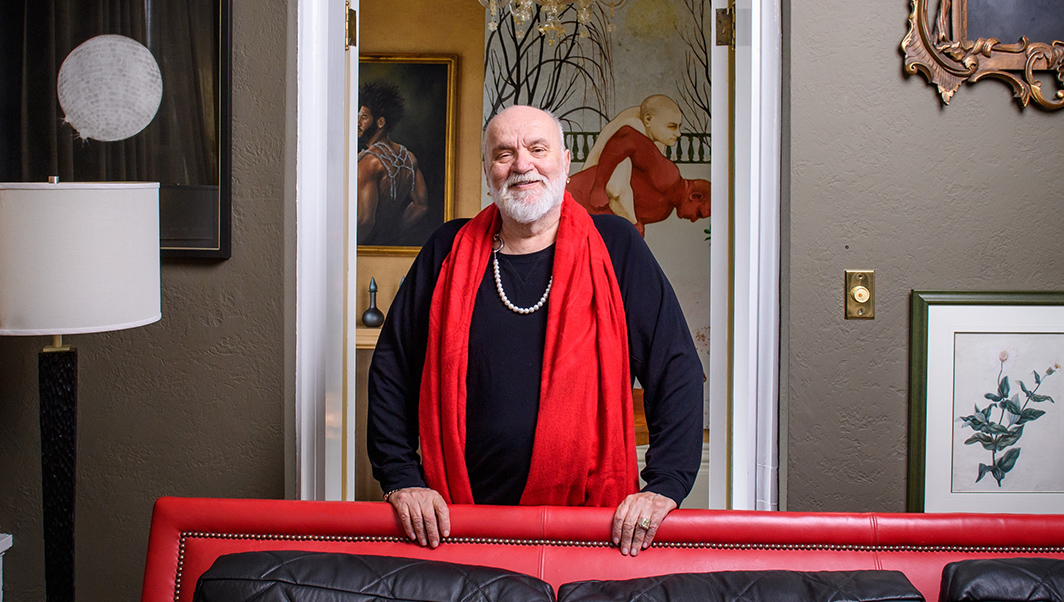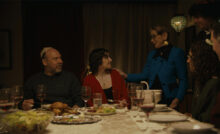Exclusive Interview: Salah Bachir Brings Us Behind the Pages of First to Leave the Party


Renowned for his philanthropy, art curation, activism, and insider status in Hollywood, Salah Bachir is truly incomparable. With a rich history spanning over four decades in the industry, Salah’s magnetic enthusiasm for life, art, and community has endeared him to many.
Now, he masterfully weaves his extensive tapestry of connections and experiences into the pages of First to Leave the Party—an absorbing and compulsively readable memoir that brings to light the captivating stories from the extraordinary life of Salah Bachir.
Pop Culturalist had the pleasure of speaking with Salah about First to Leave the Party, the figures who have shaped and impacted his life, and more.
PC: First to Leave the Party tells your life story told through the interactions and encounters that you’ve had with those who have inspired and empowered you. When did you realize that this was the format in which you wanted to tell your story?
Salah: I published some of the most widely read magazines in Canada, including Famous, Premiere, and Cineplex magazines. We had a motto for articles: light, tight, and bright. They were designed to be read in the theater before a film or while waiting in a doctor’s office.
After a six-month hospitalization due to a kidney transplant and sepsis, I began sharing stories on social media to uplift and empower people who were also housebound. I continued this practice during COVID. I shared stories of different celebrities I had known on their birthdays, such as Ella Fitzgerald, and recounted my friendship with her, as well as her gratitude to her friend Marilyn Monroe, who helped launch her career. These were stories of people I interviewed and became friends with, like Marlon Brando and Gregory Peck, or stars we gave lifetime achievement tributes to such as James Stewart, Ginger Rogers, Patricia Neal, and Van Johnson.
The format grew out of those posts on social media. I wanted to highlight their contributions, how they affected me, and what we bonded over. Through their individual stories and struggles for acceptance, whether it was their weight, skin color, or sexual orientation, I tell my story. You get to know a little about each of them but a lot about me.
PC: This is one of the first books to feature the author’s pronouns on the cover. Why was that so important to you, and what does this milestone mean to you?
Salah: I couldn’t believe that this had not been done before on a cover. I thought using my pronouns was just a courtesy that we should all adopt. It really is such a small but significant gesture. Every corporation should encourage the use of pronouns. Normalizing it is empowering and removes the onus from only certain people having to tell you how they identify. I hope this encourages others to do the same.
PC: There are so many different encounters included in this memoir. How did you decide what made it to the final draft? What was it like reliving these moments again?
Salah: The book is structured so that you can read one chapter at a time without having to read all the chapters. It begins with Marlon Brando stopping by my parents’ house for a barbecue when he was filming The Freshman in Toronto in 1989 and ends with k.d. lang singing at my wedding. There could certainly have been other chapters, but we carefully considered the ones we chose, and some were simply anecdotes that added completeness to the memoir and my journey.
It was very emotional having to relive a lot of those moments. I still cry reading some of them. What would Andy Warhol or Keith Haring be like today? How I long to have one more dinner with my parents and grandparents. That’s why it was important for me to have somebody else read the audiobook, and I was elated when Ann-Marie MacDonald agreed to do it.
PC: You have been a pioneer for so many different communities. How did you discover your own voice as a philanthropist and an activist?
Salah: I felt the need to speak up, to be heard. Given the prevalence of homophobia and racism, I wanted to ensure that the communities we raise money for and contribute to are committed to diversity and inclusion. I never wanted anyone to speak for me on my behalf. Despite being very successful, I believe it’s crucial that we have a voice, make a contribution, and be heard.
PC: Did anything surprise you about the process of writing your memoir? What was the biggest takeaway?
Salah: It wasn’t a complete surprise, but writing your memoir with someone else as a sounding board and editor is invaluable. I was very glad to reconnect with my old friend Jami Bernard, who served as my voice of reason and helped edit it properly.
The biggest takeaway for me is my resilience, strength, and the realization that I did go through all that. When you put it all down on paper and sum it up, it’s been quite a journey so far.
PC: With it out now, what do you hope readers take away?
Salah: I believe it’s a story that resonates with the universal struggles and roles we all experience. I hope it provides hope and confidence to those trying to find their place, encouraging them to reach out for help and seek a community. The message is not to hide behind anything, and I hope it inspires everyone to strive for a world where people can live the way they want, love who they choose, and express themselves without judgment. We all need to make more room at the table.
Buy First to Leave the Party today!
To keep up with Salah, follow him on Instagram. Pick up your copy of First to Leave the Party today.
Photo Credit: George Pimentel
Recent Posts
Daring, Unpredictable, and Unforgettable: Tyler Cornack’s ‘Mermaid’ Dives into SXSW 2025 with Stars Johnny Pemberton and Avery Potemri
To say Tyler Cornack is a visionary would be an understatement. His fearless approach to…
SXSW 2025: Daisy Friedman and Arielle Friedman on ‘Unholy,’ Authentic Representation, and Capturing the Pressures of Family, Tradition, and Identity
There’s nothing more powerful than a filmmaker reclaiming their own story, but true brilliance comes…
Inside ‘Sweetness’: How Writer-Director Emma Higgins and Her Cast Built One of SXSW’s Most Unforgettable Films
Sweetness isn’t just a film—it’s a layered, unsettling portrait of fame, grief, fixation, and the…
SXSW 2025: Jim Sturgess and Rory Walton-Smith Talk ‘Mix Tape’ and the Music and Memories That Shape Us
Few projects at this year’s SXSW are likely to strike a chord quite like Mix…
Exclusive Interview: MayMay Entrata on Finding Strength in Vulnerability, Embracing a New Era, and the Story Behind “Paradise”
From breaking barriers as the first Filipina to walk in Arab Fashion Week to delivering…
SXSW 2025: Acclaimed Filmmaker José María Cabral Discusses His Powerful Documentary, ‘42 Street’
Few filmmakers capture the raw, unfiltered essence of a place quite like José María Cabral.…


